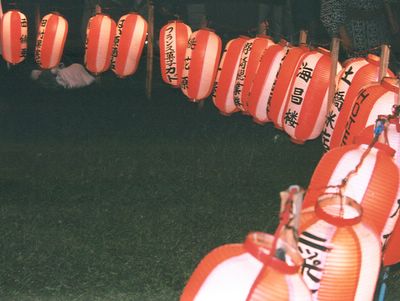Every once in a great while I see a "Hollywood" movie. I do so always under similar conditions. First, it has not to require my paying for it directly--for instance, when I have taken international flights, or when I find myself at my brother's house and flip through the dozens of films his cable hook-up affords him. Secondly, through fatigue, mental laxity, or other extenuating factors, I persuade myself that in watching such a film, I might actually find something memorable and inspiring: if not a good performance, or a well-played scene, then at least a momentary, beautiful depiction of nature, or possibly even something resembling an original thought.

So it was that, last night, at the end of a long day, I started channel surfing at my brother's place and came upon the opening scene of "The Day After Tomorrow." Hmmm, I thought, this is the film that the progressive political organization
MoveOn.org sent me a batch of e-mail about sometime last year, urging me both to see it and to get anyone who might not be educated about matters of global warming to see it. That alone suggested, at least superficially, that a thought might be lurking within what otherwise promised to be a standard "no risk" multi-million dollar visual and aural entertainment package on par with any hand-to-hand combat video game (but requiring less input from the consumer).
I won't hide the fact that the second condition of my viewing such a film is inevitably frustrated, and that watching "The Day After Tomorrow" was no exception to this apparent rule. But I should first say that the film did have an idea of sorts. Not an original idea, exactly, and surely not a filmic or artistic idea, but an idea imported from certain scientific circles. The idea--abrupt climate change--has its own merits (see intriguing documentation
here) and surely has been served well by popularization--especially in the United States, where the reality of global warming remains idiotically in dispute thanks primarily to manifold pressures exerted by the coal and gas industries upon media of all sorts, decision-makers, and American culture generally. The question for me, though, is whether, in integrating the idea of abrupt climate change into a
recipe film such as this, the filmmakers managed to make a good film. On that account, I was not witness to the least bit of supportive evidence.
I imagined a little scene in which two persons first exchanged ideas for this film.
A: We need some kind of catastrophe. Think post-9/11. The stuff is selling more than ever.
B: Yeah, that's right. And, you know, my nerd cousin Marty told me about this idea. It's not exactly the old global warming scare--that's probably too much a hot-button issue--but a kind of side dish to that. He said he read an article about it. It was *rapid climate change* or something like that. The thing is, it would be perfect for creating lots of panic scenes. We could have tornadoes in L.A., a freeze-over in Manhattan, torrential rain in D.C., and more. We could even flatter the Japanese market with a little ice storm in Tokyo.
A: Great, that's perfect! We're practically done. All we have to do is spit out the script.
B: Right. But what about the love interest?
A: Well, we'll get that cutey face who did "Heat of the Night" last year. His agent will let him join up for less than 40 mil. He's not yet the cream of the crop. We might be able to catch him as his wave begins to crest.
B: Kinters, you mean?
A: Yeah, that's the one.
B: OK, what about the girl?
A: Hmm... that's more difficult. I've looked into the names. The market is not good now for buyers. Let's just get a nice pair of knockers at a discount price. That should fit the bill. It hardly matters, anyway. The lines will be minimal. Just a few pouts, a display of touchy-feely, and maybe a dash through a traumatized crowd. Basically, a little bounce here and there, and a bit of face sucking will do the trick.
B: Right. Always does.
A: One thing, though. Can't we still manage to make this into something of a family movie? All it would take is a "man overcomes resentment towards brother" or an "overworked father insists on keeping his next promise to son." One of those cards.
B: Well, I don't see why not. As long as there's at least 10 parts noise and trauma to one part sentimentality.
A: Yep. That's the M.O.
B: Personally, I like to get back to the "repentant, overworked father" thing. It's been two or three films since we used that one.
A: I've no objection, believe me. Say, about the the stunts and catastrophes... We'll spend, say, 10 or 12 months with these and then, once we emerge from the stunt labs, find the cute faces we talked about to patch it all together into some kind of story line.
B: OK, so, I'll write the script tonight over a few beers and, if you think I might drop anything from it, then just e-mail me by tomorrow night. But there really shouldn't be much to change, since we've already been through the whole "risk avoidance" thing with corporate headquarters a hundred thousand times.
A: I know. Almost makes you sick, doesn't it?
B: Yeah, but it also makes you filthy rich at the end of the day, too.
A: Ha! That's certainly true!
So much, then, for my general sense about how this film was, or how it may as well have been, hatched.
One thing about the title of this film, a title whose relevance to the action or idea of the film is not particularly clear or suggestive. Does anyone share my sense that English-language, and particularly "Hollywood" movies, are increasingly left untranslated when introduced to foreign markets? I do sometimes wonder who makes these kinds of decisions. Surely it is not some underpaid college student who gets hired in haste to create subtitles for a film set on imminent release. I mention this because the title "The Day After Tomorrow" has, it seems, remained untranslated in Japanese, despite the fact that Japanese has a wonderful one-word equivalent, namely: あさって[asatte]. This word simply means "the day after tomorrow." It is, at least, economical. It also avoids the awkwardness of the original. I assume that the English title was retained not only because of the standard appeal of "exoticism" that presumably attracted Japanese audiences but also because, left in English, the title more easily functions as a kind of corporate label, much like "Coca-Cola" or any other corporate product name that resists translation. The fact that "Hollywood" films today are devised, market-tested, and marketed in much the same way as many other products--including soft drinks and prescription drugs--supports this rationale for opting not to translate. Perhaps other things are going on here, though...
In mentioning the untranslated title and imagining the little "creative" moment as I did, I have neglected to talk about the film "itself." But that was not without cause. The film is simply the same film you have seen everytime you have seen a "Hollywood" movie in the past decade or so. Yes, it raises a spicy little social issue of grave importance to the destiny of mankind. But that fact, and the catastrophe for which this issue sets the stage, does not obtrude upon the "happy ending," nor does it completely block out the "love and family" thematizing without which a "Hollywood" blockbuster wanna-be could not be recognized as such. The actors do not act so much as act like all the hordes of stereotypes that have gone before them. The lead male role, for instance, is played by Dennis Quaid, and Quaid does not create a character or personality; he just tries to hold the same poses, and employ the same voice tone as, say, Harrison Ford has done in his last twenty or so films (which is not to grant Harrison Ford any acting skills, either). Every gesture is stereotyped and pre-programmed with nauseating precision, and all Quaid has presumably done is to not displease his bossmen by attempting anything faintly original.
Mind you, there's a lot to laugh at in this film; only, none of the laughs are apparently sought out by the filmmakers. They are, rather, the unintended consequence of poor filmmaking whose sole pursuit of box-office wealth blinds the the filmmakers to the most outrageous aspects of their own film-product. For instance, I found myself chuckling at the fact that although the entire nation of Canada was obliterated in a deep freeze, no character even wastes a word on the matter. (Clearly, the Canadian "looney" or dollar demands much less attention from today's corporate filmmakers than does, say, the Japanese Yen.) The very fact that New York and Washington, D.C. remain the center of the world, as they always do in intergalactic or geo-catastrophic films, and that the Statue of Liberty gets buried--once again!--up to her crown and torch while Japan, as the world's second largest film-going economy--once again!--is patronizingly fitted with a complementary role, all caught me somewhere between a chuckle and exasperation.
It is perhaps too easy to criticize "Hollywood films." Perhaps it's no more difficult than putting one foot in front of the other. And, like the films themselves, the critiques run the risk of becoming repetitive. Still, such critiques are no less necessary, and I often wonder why they seem so rare in the nation's star-and-thumbs-up crazed movie press. Could we at least see some degree of subtlety introduced into the old thumbs-up, thumbs-down dichotomy? I can think of at least one other digit that could be useful in appraising "Hollywood" films...
There's much more to say about "The Day After Tomorrow," including its lamentable (i.e., noisy, clamorous, relentless) soundtrack--a soundtrack that, like so many today, dictates "emotions" to the viewer in shameless tyranny--but I will leave all that for another day after tomorrow.
photo: Omaha Beach, Bayeux, France - by terrette (13063)




